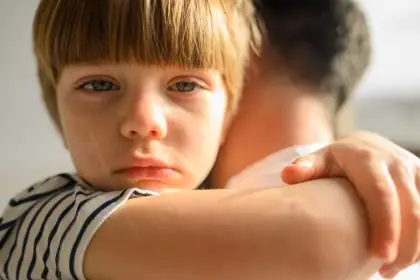Supporting a loved one coping with Post-Traumatic Stress Disorder (PTSD) can be a challenging yet profoundly impactful journey.
The effects of trauma can be pervasive, affecting not only the individual directly involved but also those within their circle of care and support.
Understanding and navigating the complexities of this condition are crucial in providing effective support.
In this article, we delve into five proven strategies that offer guidance and insight into effectively aiding a loved one dealing with PTSD.
PTSD, or Post-Traumatic Stress Disorder, is a mental health condition that can develop after a person has been exposed to a traumatic event.
These events might include situations like war, natural disasters, serious accidents, physical or sexual assault, or other forms of violence.
The symptoms of PTSD can manifest in various ways, such as flashbacks, nightmares, severe anxiety, and uncontrollable thoughts about the event.
Other symptoms include avoiding reminders of the traumatic event, negative changes in beliefs and feelings, and hyperarousal, which can involve being easily startled, feeling tense, or having difficulty sleeping or concentrating.
Treatment for PTSD often involves psychotherapy, medication, or a combination of both.
Cognitive Behavioral Therapy (CBT) and Eye Movement Desensitization and Reprocessing (EMDR) are commonly used psychotherapies.
Medications like antidepressants may also be prescribed to help manage symptoms.
Support from friends and family, a strong social support network, and self-care strategies are also essential in managing PTSD.
It’s a complex condition, and the treatment approach can vary from person to person.
PTSD and relationships
PTSD can significantly impact relationships in a variety of ways.
Here are a few common dynamics:
Communication Issues
People with PTSD might have difficulty communicating about their feelings or experiences related to the trauma.
They might struggle to express their emotions, leading to misunderstandings or distance in relationships.
Avoidance
Those with PTSD might avoid places, situations, or discussions that remind them of the traumatic event.
This avoidance can create strain in relationships, as it may limit activities or cause partners to feel isolated or excluded.
Emotional Distance
PTSD can cause emotional numbing, making it hard for individuals to connect or express affection.
This emotional distance might be mistaken for disinterest or lack of care by their partners.
Hyperarousal and Irritability
Symptoms like hypervigilance or irritability might lead to tension in relationships.
Partners may feel like they’re walking on eggshells or that the person with PTSD is frequently on edge, leading to increased conflict or stress.
Role Changes
PTSD symptoms can affect a person’s ability to perform usual roles in a relationship, such as being a supportive partner, parent, or friend. This shift can be challenging for both parties.
However, with understanding, support, and potentially seeking therapy, these challenges can be managed.
Couples therapy or family therapy can help address communication issues, provide strategies to manage symptoms, and improve understanding between partners.
Patience, empathy, and learning coping mechanisms together can help relationships navigate the difficulties caused by PTSD.
5 ways to help a loved one with PTSD
Supporting a loved one with PTSD involves patience, empathy, and understanding.
Here are five ways to offer support:
Educate Yourself
Learn about PTSD to understand what your loved one is going through.
Knowing the symptoms, triggers, and potential treatments can help you be more supportive and understanding.
Self-education is a powerful tool when supporting a loved one with PTSD for several reasons:
- Understanding:
Learning about PTSD helps you understand what your loved one is going through.
This understanding can build empathy and patience, making it easier to offer the right kind of support. - Recognizing Triggers:
Education about PTSD can help you identify triggers—specific situations, words, or actions that can cause distress to your loved one.
Knowing these triggers can assist you in avoiding or minimizing them, creating a safer and more comfortable environment. - Better Communication:
Educating yourself about PTSD can enhance your communication with your loved one.
It allows you to ask more informed and empathetic questions, as well as use language that is supportive and understanding. - Supportive Role:
Your knowledge about PTSD can help in advocating for your loved one.
It can guide you in seeking appropriate professional help or resources, offering the right encouragement, and assisting them in navigating their journey toward recovery. - Taking Care of Yourself:
Self-education can also emphasize the importance of self-care.
It reminds you to maintain your own mental and emotional well-being, as supporting someone with PTSD can be emotionally taxing.
By learning more about PTSD, you equip yourself with the tools and understanding necessary to be a more effective and supportive presence in your loved one’s life. It’s a powerful way to demonstrate care and empathy.
Be Patient and Nonjudgmental
Understand that recovery takes time and that your loved one might have good days and bad days.
Be patient and avoid judgment or pressure, as it can exacerbate their stress.
Being patient and non-judgmental is crucial when helping a loved one with PTSD because it creates a supportive and safe environment for their recovery.
Here’s how this approach can be helpful:
- Building Trust:
Trauma can erode a person’s sense of safety and trust in others.
Being patient and non-judgmental helps rebuild trust.
Your loved one needs to feel that they can confide in you without fear of criticism or rejection. - Reducing Stress:
People with PTSD often experience heightened stress and anxiety.
Being patient and non-judgmental can reduce stress by not adding to their emotional burden with impatience, frustration, or criticism. - Emotional Safety:
A non-judgmental attitude provides emotional safety.
Your loved one is more likely to share their thoughts and feelings with you when they know you won’t judge or condemn them for their experiences or reactions. - Validation:
Your patience and non-judgmental stance validate their experiences and emotions.
This acknowledgment can be immensely comforting and reassuring. - Encouraging Healing:
A patient and non-judgmental attitude supports your loved one’s healing process.
It allows them to feel heard and understood, which can be a critical part of recovery. - Empowerment:
Your support can empower your loved one to seek help, engage in therapy, or explore coping strategies.
Knowing that they have a non-judgmental ally can boost their confidence and motivation. - Strengthening the Relationship:
By being patient and non-judgmental, you demonstrate your love and commitment to the relationship.
Over time, this can strengthen your bond and help your loved one feel valued and cared for.
In summary, being patient and non-judgmental creates a positive and nurturing environment that is essential for your loved one’s recovery from PTSD.
It fosters trust, reduces stress, and empowers them to seek help and healing. It’s a crucial component of providing effective support.
Offer Support and Encouragement
Be a supportive listener. Encourage them to share their experiences but don’t push if they’re not ready.
Offer to assist in finding resources or accompany them to therapy sessions, if they’re comfortable.
Offering support and encouragement to a loved one dealing with PTSD can significantly aid their recovery and well-being in various ways:
- Emotional Comfort:
Providing support shows that you’re there for them, offering emotional comfort and a sense of security.
This reassurance can be immensely comforting for someone struggling with PTSD. - Reducing Isolation:
PTSD can make individuals feel isolated or misunderstood. Your support and encouragement can help reduce this isolation by letting them know they’re not alone and that you’re there to listen and help. - Validation:
Acknowledging their feelings and experiences without judgment validates their emotions.
This validation is crucial for someone dealing with PTSD, as it helps them feel understood and accepted. - Boosting Confidence:
Your encouragement can help boost their confidence.
Facing the challenges that come with PTSD can be daunting, but your belief in their strength and resilience can be a powerful motivator. - Motivation for Seeking Help:
Your support can encourage them to seek professional help.
Knowing they have someone who supports and believes in them can make the process of seeking therapy or treatment less intimidating. - Offering Practical Help:
Your encouragement might involve assisting in finding resources, recommending support groups, or helping to facilitate access to therapy.
Your active support can make it easier for them to take steps toward healing. - Being a Source of Hope:
Your support and encouragement provide a sense of hope.
Knowing that someone is in their corner can provide optimism and a more positive outlook on their journey to recovery. - Strengthening the Relationship:
Your support can strengthen your relationship.
Sharing in the difficulties and triumphs of their recovery can deepen the bond between you.
In essence, offering support and encouragement creates a foundation of emotional safety, validation, and hope.
It’s a key element in helping someone with PTSD feel understood, supported, and motivated on their path to healing.
Create a Safe Environment
Help create a safe and comfortable environment by minimizing triggers or stressful situations.
Be understanding if they need space or need to avoid certain places or activities.
Creating a safe environment for someone with PTSD is crucial for their well-being and recovery.
Here’s how it can be helpful:
- Minimizing Triggers:
Understanding their triggers and actively working to minimize exposure to them is essential.
This can involve avoiding certain places, situations, or activities that may cause distress or flashbacks related to the trauma. - Predictability and Routine:
Establishing a predictable and stable environment can provide a sense of safety.
Consistent routines and clear communication about plans or changes can help reduce anxiety. - Respect Boundaries:
Respecting their boundaries is vital.
This involves understanding their need for personal space and not pushing them beyond their comfort levels.
Being sensitive to their limitations contributes to a safer environment. - Open Communication:
Encouraging open communication without pressure is important.
Allowing them to express their feelings and concerns without fear of judgment or criticism creates a safe space for them to share their experiences. - Offering Reassurance:
Providing reassurance about their safety in the present moment can be comforting.
Reminding them of their safety and that the traumatic event is in the past can help alleviate anxiety. - Emotional Support:
Being emotionally available and supportive helps create a safe environment.
Knowing they have someone to turn to when feeling overwhelmed or distressed contributes to their sense of security. - Understanding and Patience:
Demonstrating understanding and patience when they’re dealing with their symptoms creates a supportive atmosphere.
This reassures them that they’re not being judged for their struggles. - Consistency and Reliability:
Being consistent and reliable in your support is important.
Knowing they can count on you for help, understanding, and empathy fosters a safe and secure environment.
By creating a safe environment, you’re contributing to a setting where your loved one feels understood, supported, and less vulnerable to triggers that can exacerbate their symptoms.
This environment promotes their well-being and aids in their journey toward healing from PTSD.
Encourage Professional Help
Gently encourage them to seek professional help.
Therapy, medication, or support groups can be beneficial.
Be supportive and understanding if they’re hesitant, but gently remind them that seeking help is a positive step toward healing.
Encouraging your loved one to seek professional help for their PTSD can be incredibly beneficial for several reasons:
- Expert Guidance:
Mental health professionals have the expertise and experience to provide appropriate guidance and support for managing PTSD.
They can offer tailored treatment strategies based on your loved one’s specific needs. - Specialized Therapy:
Professionals can offer specific therapies like Cognitive Behavioral Therapy (CBT), Eye Movement Desensitization and Reprocessing (EMDR), or other evidence-based treatments designed to address PTSD symptoms. - Medication Management:
For some individuals, medication might be a helpful part of their treatment plan.
Psychiatrists or doctors can evaluate and prescribe medication if needed, working in conjunction with therapy. - Safe and Supportive Environment:
Therapy provides a safe and confidential space for your loved one to explore their feelings and experiences.
It’s a dedicated environment where they can address their trauma without fear of judgment. - Validation and Understanding:
Therapists are trained to understand and validate your loved one’s experiences, which can be immensely reassuring for someone struggling with PTSD. - Learning Coping Strategies:
Therapy can equip your loved one with effective coping strategies and tools to manage their symptoms.
These skills can be invaluable in handling triggers and stressful situations. - Recovery Support:
Professional help can provide a structured path to recovery, offering milestones and a clear process to work through the impact of trauma.
Encouraging professional help doesn’t necessarily mean pushing your loved one into therapy but rather gently supporting and guiding them towards seeking help.
Express your willingness to help them find a therapist, accompany them to appointments, or provide emotional support throughout the process.
Professional help often plays a pivotal role in the journey toward healing and managing PTSD.
Don’t forget yourself
It’s common to become deeply involved in supporting a loved one with PTSD to the point of neglecting your own well-being.
Here are some strategies to avoid that:
Set Boundaries
Understand that while you want to be there for your loved one, you need boundaries to protect your own mental and emotional health.
Set limits on the time and energy you can dedicate without neglecting your own needs.
Self-Care
Prioritize your own self-care. Make time for activities and practices that recharge you, whether it’s exercise, hobbies, meditation, or spending time with friends and family.
Seek Support for Yourself
Don’t hesitate to seek your own support network.
Whether it’s talking to friends, family, or a therapist, having an outlet to share your feelings and experiences can be incredibly helpful.
Educate Yourself
Understanding how to support someone with PTSD involves knowing your limits as well.
Educate yourself about caregiving stress and burnout so that you can recognize the signs in yourself and take steps to address them.
Practice Mindfulness
Being mindful of your own needs and emotions is crucial.
Check in with yourself regularly to gauge your own mental and emotional state.
Maintain Routines
Stick to your own routines and responsibilities.
Don’t let your personal life and obligations fall by the wayside while caring for your loved one.
Communicate Openly
Be honest with your loved one about your own limitations and needs.
Open communication can help them understand when you need some space or time for yourself.
Remember, taking care of yourself doesn’t mean you’re neglecting your loved one; it actually enables you to be a better and more effective support for them.
It’s crucial to maintain your own mental and emotional well-being so that you can continue to provide the necessary support for your loved one.
Conclusion
Supporting a loved one coping with PTSD is a journey that demands patience, understanding, and a delicate balance between providing care and safeguarding your own well-being.
Educating yourself about PTSD serves as a foundation, offering insights into the condition, its symptoms, and triggers.
This knowledge arms you with the tools to navigate their experiences and to respond with empathy and awareness.
Being patient and non-judgmental establishes a safe emotional space, enabling your loved one to share their feelings without fear of rejection or criticism.
Creating an environment free of triggers fosters a sense of security, vital for their recovery.
Moreover, offering support and encouragement serves as a lifeline, communicating your unwavering commitment to their well-being.
Encouraging professional help, though crucial, should be a gentle nudge rather than a forceful push.
It signifies your belief in their ability to heal and manage their condition with expert guidance.
However, amidst this journey of support, it’s easy to forget oneself. Setting boundaries, prioritizing self-care, seeking your own support network, and maintaining open communication are key in preventing caregiver fatigue and safeguarding your own mental and emotional health.
Remember, being a support system doesn’t mean shouldering the burden alone.
It’s a collaboration between understanding, empathizing, and ensuring your own well-being, creating a healthier environment for both you and your loved one.
This journey, while challenging, holds the potential for healing, growth, and strengthened bonds.
The path to supporting someone with PTSD is paved not only with knowledge and empathy but also with self-care and the recognition of your own needs.
FAQs
What is the first step in helping a loved one with PTSD?
Educate yourself about PTSD to understand their experiences better.
How can I support a loved one with PTSD effectively?
Be patient, non-judgmental, and create a safe and supportive environment for them.
How do I encourage someone with PTSD to seek professional help?
Gently offer your support and provide information about available resources and the benefits of seeking professional help.
Is it essential to take care of myself while supporting someone with PTSD?
Yes, self-care is crucial. Set boundaries, prioritize your well-being, and seek your own support network.
What role does encouragement play in helping a loved one with PTSD?
Encouragement provides reassurance, promotes seeking help, and instills hope during their recovery journey.
How can I create a safe environment for a loved one with PTSD?
Understand their triggers, establish routines, respect their boundaries, and provide emotional support.
What should I do if I feel overwhelmed while supporting someone with PTSD?
Reach out for your own support network, maintain open communication, and practice self-care to avoid caregiver fatigue.





